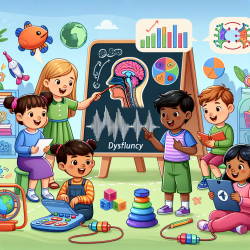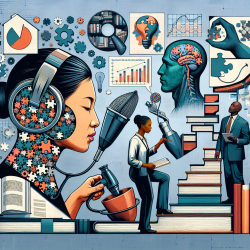Introduction
In the realm of speech-language pathology and online therapy services, understanding the nuances of emotional intelligence (EI) and entrepreneurial self-efficacy (ESE) can significantly enhance a practitioner's approach to therapy. This blog delves into the findings of a research study titled The Relationship between Emotional Intelligence and Entrepreneurial Self-Efficacy of Chinese Vocational College Students, offering insights into how these concepts can be applied to improve outcomes in therapy settings.
Understanding the Research
The study explored the correlation between emotional intelligence and entrepreneurial self-efficacy among Chinese vocational college students. The findings revealed a significant positive correlation between EI and ESE, suggesting that as emotional intelligence improves, so does entrepreneurial self-efficacy. This is particularly relevant in educational settings where fostering entrepreneurship is crucial.
Key Findings and Their Implications
- There is a positive correlation between EI and ESE. Higher EI leads to more stable ESE.
- Gender differences were noted, with males exhibiting higher ESE than females, though no significant difference in EI was observed.
- Grade differences indicated that third-year students showed higher ESE and EI than first and second-year students.
These findings underscore the importance of integrating emotional intelligence training in educational curricula to enhance entrepreneurial self-efficacy, which can be extrapolated to therapeutic practices.
Applying the Research to Practice
For practitioners in the field of speech-language pathology, especially those involved in online therapy services like TinyEYE, incorporating emotional intelligence development into therapy sessions can be beneficial. Here are some practical applications:
- Emotional Regulation: Teach children techniques to manage their emotions effectively, which can enhance their learning and communication skills.
- Self-Efficacy Building: Encourage activities that boost children's confidence in their abilities, fostering a sense of accomplishment and motivation.
- Social Skills Development: Use group therapy sessions to improve children's ability to understand and manage emotions in social contexts.
Encouraging Further Research
While the study provides valuable insights, it also opens avenues for further research. Practitioners are encouraged to explore how emotional intelligence training can be tailored to different age groups and settings to maximize its impact on entrepreneurial self-efficacy and overall therapy outcomes.
Conclusion
Integrating the principles of emotional intelligence and entrepreneurial self-efficacy into therapy practices can lead to more effective and holistic outcomes for children. By fostering these skills, practitioners can help children navigate their emotions and build confidence in their abilities, setting them up for success in various aspects of life.
To read the original research paper, please follow this link: The Relationship between Emotional Intelligence and Entrepreneurial Self-Efficacy of Chinese Vocational College Students.










